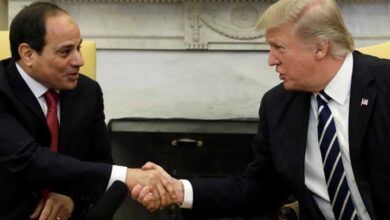A travel ban enforced on American employees of two US NGOs has proved to be a litmus test for the state of relations between Washington and the interim government in Cairo.
The two have remained uncertain partners since the military council came to power almost a year ago, but the most recent developments have brought forth strong reactions from US lawmakers, spurring reexamination of the US military aid package to Egypt and speculation that the relationship has reached a turning — or perhaps even a breaking — point.
“Overall, what has been happening represents the beginning of what I have previously called the 'long goodbye' between Washington and Cairo,” Steven Cook, a senior fellow for Middle Eastern studies at the Washington-based Council on Foreign Relations, told Egypt Independent in an email.
“This is as much a function of US unhappiness over the NGO raid and other events as it is about Egyptian politics and the changes that would naturally happen as a result of dramatic political change in Egypt,” he said.
Under the political pressure, Washington lobbyists for Egypt’s Defense Ministry cut ties with Cairo last week, ending a decades-long tradition of Egyptian representation in the US capitol.
Former members of the House of Representatives Bob Livingston and Toby Moffett, along with prominent and longtime lobbyist Tony Podesta, have announced that they will no longer represent the interests of the Egyptian government, ending a contract that paid them collectively more than US$1 million a year since 2007 to market Egypt’s issues to those on Washington’s Capitol Hill.
In late December, military teams raided the offices of several international NGOs in Egypt, seizing computers, cell phones, documents and cash. American government officials bristled at the investigation and the insinuations that they were trying to incite rebellion through the NGOs’ activities.
Soon after, US media exposed a memo circulated by the three lobbyists explaining and defending the actions taken by Egypt’s armed forces, and they came under fire from their American colleagues.
In the past, lobbyists’ activities have varied from distributing postcards to lawmakers saying, “Did you know this fact about Egypt?” to hosting lunch for congressional staffers to raise awareness about forgiving Egypt’s debt during the first Gulf War. In the lead up to Egypt’s 2010 parliamentary elections, they also opposed a Senate resolution aimed at “supporting democracy, human rights and civil liberties” in Egypt.
“We hope that Egyptians continue to enjoy the deepening of democracy in their country, and that Egypt remains a strong, stable and vital ally of the United States,” the three lobbyists said in a joint statement Saturday confirming they would be kissing the partnership goodbye.
Members of Congress have also spoken in harsh terms about the ruling military council’s investigation of the American NGOs.
“This crisis has taken a new and disturbing turn with reports that the Egyptian government is prohibiting employees of these NGOs, including American citizens, from leaving the country,” John McCain, a US senator who is also chairman of the International Republican Institute, said in a prepared statement.
“I call on the Egyptian government and the Supreme Council of the Armed Forces to cease the harassment and unwarranted investigations of American NGOs operating in Egypt,” he said.
Several other members of Congress echoed Senator McCain’s sentiments.
In its latest move, SCAF banned six American citizens from traveling, including Sam LaHood, son of US Transportation Secretary Ray LaHood. The seven are employees of the National Democratic Institute and the International Republican Institute, where LaHood is director. Both are US-funded NGOs that promote democracy initiatives in various countries but have been working in Egypt since 2000 without a license, despite repeated requests of former President Hosni Mubarak.
Cook said this also might play into the narrative that the military council has been cultivating — that of a malevolent “foreign hand” — which has been the cause of trouble in the country, even at the expense of the military losing the US$ 1.3 billion that it receives from Washington yearly.
“The Federal Military Funding is going to change, and I believe the Egyptian armed forces might be willing to live with those changes,” he said. “It’s easier to decry 'the foreign hand' when said hand is cutting your aid.”
Ultimately, Cook said he’s inferred from the generals’ actions that SCAF might be looking to distance itself both financially and policy-wise from the American government, though their end goal is impossible to discern.
There is likely an element of truth to SCAF’s narrative of foreign influence with a political agenda, said Sheila Carapico, former chair of the political science department at the American University of Cairo.
That story isn’t completely true though, she said.
“It’s very complicated, on the one hand because it’s absurdly difficult [for foreign NGOs] to get a license, and I don’t want to necessarily be siding with the government,” said Carapico, who is now a professor of political science and international studies at the University of Richmond.
“But on the other hand, they’re foreign organizations, and I think it’s naive to assume they are not going to be political. I think if something similar were going on in any other country it would be perceived in the same way,” she added.
The organizations were working without licenses, and in some instances, were indeed impinging on Egypt’s sovereignty and breaking Egyptian law, Carapico said. But at the same time, they did not foment revolution and were giving funds to Egyptian organizations doing human rights work that couldn’t have been raised successfully under Mubarak.
The result of these two parallel truths, she said, shows the complexity of the current relationship between Egypt and the US, which she thinks neither party will “sever lightly.”
“I think simultaneous narratives can be true,” she said. “All propaganda has an element of truth to it.”




